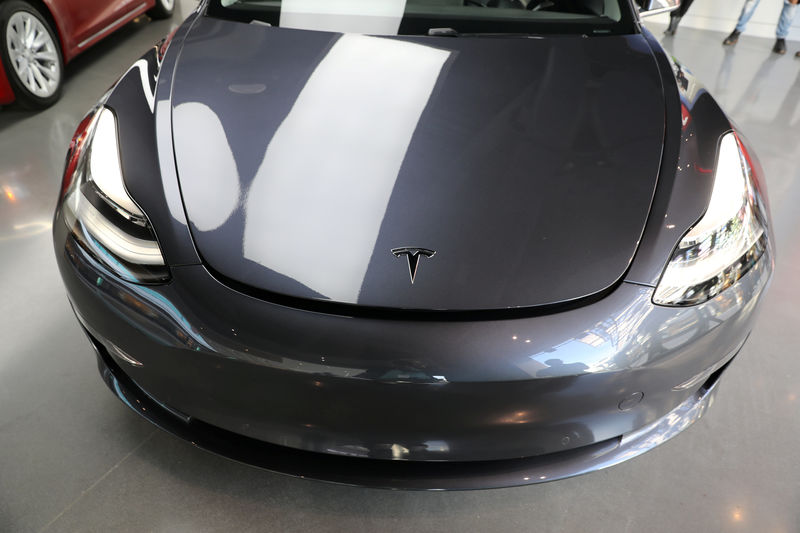By Pratima Desai
LONDON (Reuters) - Tesla's shift to a magnetic motor using neodymium in its Model 3 Long Range car adds to pressure on already strained supplies of a rare earth metal that had for years been shunned because of an export ban by top producer China.
Efforts by governments around the world to cut noxious emissions produced by fossil fuel-powered cars is driving demand for electric vehicles and the metals used to make them, such as lithium and cobalt which are key ingredients for batteries.
Now the spotlight is on neodymium. Several auto makers already use permanent magnet motors that rely on the metal because they are generally lighter, stronger and more efficient than induction motors that are based on copper coils.
But it is the switch to neodymium by Tesla, an auto maker that has staked its future solely on the electric vehicle, that is showing the way the industry is moving and the direction of demand for the rare earth metal.(For a graphic of Neodymium market balance click http://reut.rs/2FD6bUb)
Research group imarc estimates the market for the neodymium-iron-boron magnet used in the motors is now worth more than $11.3 billion, with demand for the magnets rising at a compound annual growth rate of 8.5 percent between 2010 and 2017.
"Some electric car motors use the permanent magnet technology, probably the most famous is the Tesla Model 3 Long Range. All the other Tesla models -- Model X and Model 3 standard -- use induction motors," said David Merriman, a senior analyst at metals consultancy Roskill.
Global demand of 31,700 tonnes for neodymium last year already outstripped supply by 3,300 tonnes, he said. Demand was expected to climb to 34,200 tonnes this year and 38,800 tonnes in 2018, leaving larger deficits.
"Tesla's decision to switch to permanent magnets has completely changed the dynamics of the market," said a source at a fund manager that specialises in metals.
The price of neodymium is now about $70 a kg, well below the $500 hit after China held back shipments to Japan in 2010 during a row over disputed islands but it is still 40 percent higher than at the start of 2017.
China, which resumed neodymium exports in 2015, imposed strict export quotas across a range of rare earth metal in 2010, saying it wanted to curtail pollution and preserve resources.(For a graphic of neodymium prices click http://reut.rs/2DlOHtE)
COSTLY PROCESS
"People seem to have forgotten China's export ban. It could happen again. China is really the main producer, no one else has invested as much in rare earths," a rare earth trader said.
Despite their name, rare earths are found in many places around the world, but the process of extraction is difficult and expensive, as it requires separating multiple different metals from a single deposit. This is unlike the much simpler process, for example, of recovering copper from ore.
China has invested heavily in the rare earth metals process but its crackdown on mining, smelting and other polluting industries is forecast to slow supply. It already helped push the neodymium price to a two-year high of $96 in September.
"Rare earth production is as bad as you can get in terms of environmental damage," the trader said. "China used its dominant position before, what's to stop it doing so again?"(For a graphic of Rare Earth Producers click http://reut.rs/2Fu5HnE)
Such supply concerns are encouraging automakers to search for ways of cutting down neodymium use. Toyota Motor Corp (T:7203) said last month it had found a way to cut use of the metal in electric motors by about a fifth.
The Japanese firm said it had developed a magnet which replaced some of the neodymium with more abundant and cheaper rare earths -- lanthanum and cerium. Toyota aims to use the magnets in electric vehicle motors within the next 10 years.
Other manufacturers of electric vehicles that use permanent magnets include BMW (BMWG), Nissan (T:7201) and Geely (HK:0175).
Several companies produce rare earth metals outside China, including London-listed Rainbow Rare Earths (L:RBWR), Canada-listed Namibia Rare Earths (V:NRE) and Australia's Spectrum Rare Earths (AX:SPX).
But, for now, auto makers making permanent magnet motors remain heavily reliant on China, which according to Roskill accounted for 85 percent of global output of rare earth oxide estimated at 161,700 tonnes in 2017.

Morgan Stanley (NYSE:MS) analysts estimate electric vehicles will total 50,000 units in 2020 or 2.3 percent of the total, rising to 400,000 in 2025 or 17.4 percent, and 975,000 in 2030 or 40.9 percent.